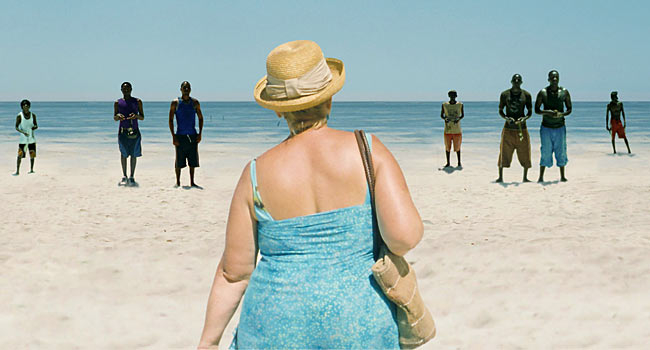
Paradise: Love is a provocative film that does not hold back from showing harsh realities that are as hard to look away from as they are to look at.

Paradise: Love is a provocative film that does not hold back from showing harsh realities that are as hard to look away from as they are to look at.
Ulrich Seidl packs a punch full of irony in Paradise: Love where neither paradise nor love is anywhere to be found. On display instead is a voyeuristic view of a shy woman in search of love who goes wild and ends up on both sides of exploitation. There is some repetition in the film as naked men and women prance around as slaves to one another, but the images never leave you and the message registers loud and clear. Even though the film is the first installment of a trilogy, a fact that I was unaware of when I first saw it at the Chicago International Film Festival, Paradise: Love can easily stand on its own.
Paradise: Love starts off with a bang, literally, as a group of autistic people slam into one another with bumper cars. The sequence is a powerful one and serves as a bit of irony when the main character preaches to the drivers to not get too wild, then later in film goes wild herself. A large amount of screaming is heard from people in the bumper cars but it appears to be out of pure pleasure, the result is an excellent display of our instinctive human desire to achieve fulfillment. And that ends up being one of the major themes of the film.
At the heart of the film is an overweight Austrian woman named Teresa who travels to the paradise beaches of Kenya to get a break from her daily grind. When she arrives at her beachside hotel, Teresa’s neat-freak personality is shown when she uses spray to disinfect everything in her room. Teresa and the rest of the vacationers stick out like sore thumbs as the close-knit group of women are all overweight and light skinned in a sea of thin dark skinned males. But unlike the other Austrian women of the group who flaunt their money around and treat the locals as their own personal sex slaves, Teresa is shy around them and is more concerned with relaxing on the beach by herself.

However, her innocence does not last long, which leads into to the other theme of the film, exploitation. Teresa is annoyed when all of the men harass her as she tries to walk the beaches, trying to sell her jewelry and claiming to give her the best deals. One man tries to seduce her but she denies him by saying that he does not love her – finally exposing what she is ultimately perusing, love. Slowly she begins to accept and even embrace the attention they give her by using her money to love. But the question that lingers is what happens when she has no money left to give?
A transformation is easily seen as the same woman who was disinfecting her room at the beginning is seen rolling around naked in it by the end of the film. The same woman who refused to have sex with a man because she did not feel loved forgoes her restraints after she realizes how much power she has. She uses the locals to fulfill her desires and they use her for her money, the common ground is that everyone is treated like an object.
The picturesque scenery of sandy beaches and clear waters gives the illusion of paradise but serves as a great juxtaposition to the monstrosity that unfolds. And there is a lot of that going on in this film. As with most of Seidl’s films, Paradise: Love is a provocative film that does not hold back from showing harsh realities that are as hard to look away from as they are to look at. The film itself is incredibly simple and easy to follow, but what it captures are complex themes found in human nature. In Paradise: Love, Seidl explores areas that others either refuse or are simply too afraid to explore.